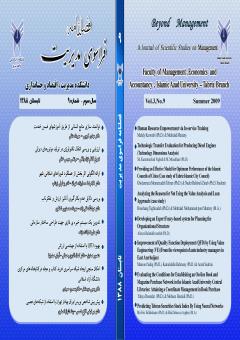Human Resource Empowerment via In-service Training
Subject Areas : Business ManagementMahdy Karroubi 1 * , Mehrdad Mattany 2
1 - Assistant Professor of Tourism Department, Allameh Tabatabaei University, Tehran
2 - Department of Management, Ghaemshahr Unit, Islamic Azad University, Ghaemshahr, Iran
Keywords: Performance, empowerment, Human Resource, Job skills, In-service training,
Abstract :
Empowerment is nowadays considered as one of the useful tools to promote employees' quality and increase organizational effectivenes.To achieve success in today's ever-changing working environment, organizations need employees' knowledge, views, and creativity. Having defined Empowerment and its goals, the article examines employees' views on how to increase employees' working empowerment through in-service training. The research method is descriptive and its type is survey. The stratified sample includes 103 participants from the employees of the Islamic Azad University in Mazandaran. The data-collection device is a closed ended questionnaire using Likert scale, and one-way t-test and analysis of variance (ANOVA) are used to analyze the data.The results have shown that in-service training courses are really effective on employees' performance, job satisfaction, required preparation to do their duties, and on improving working skills. The findings also suggest that there is a significant difference between the effectiveness averages of the two groups of men and women, and also the results by one-way t-test show that a siginificant difference exists among the three groups having 5-10, 10-15 and above 15 years of service background.
Aghayar, S. (2003). Empowerment of the New Method in a Competitive Environment. Tadbir Monthly, 135, (In Persian).
Blanchard, K., Carlos, J. P., & Randolph, A. (1996). Empowerment takes more than a minute. Sanfaroncisco: Barrett Koehler publishing.
Conger, J. A., & Konugo, R. (1988). The Empowerment Process: Integrating theory and Practice, Academy of Managemet Review, 13(3), 471-482.
Fathi Ojargah, K. (2004). Employee Training Planning. Tehran: Samt Publication, (In Persian).
Hassanzadeh, R. (2003). Research Methods in Behavioral Sciences. Tehran: Savalan, (In Persian).
Jafarzadeh, R. (2007). Transitional Model in Effective Assessment of Staff Training. Tadbir Magazine, 86, (In Persian).
Kenila, D. (2004). Empowerment of Human Resources. Translated by: M., Irannejad Parizi, & M. A., Selimian, Tehran: Iran Publishing, (In Persian).
Khatibi, A., Asgari, L., Naderi, H., & Kafash, A. (2002). A Survey on Employees Training System and Its Effect on Increasing Efficiency in Zanjan University of Medical Sciences, (In Persian).
Lampers, B. (2004). 10 Strategies for staff empowerment. Reston, 4.
Lee, M. J., & Keh, J. (2000). Is Empowerment Really a New Concept?. The International Journal of Human Resource Management, 18(14).
Lippin, T. M. (2001). Empowerment Base Health and Safety Training & Development. Alexandria, 5(7).
Metani, M. (2007). The Basics of Research Methods in Management. Babol: Mabas Publication, (In Persian).
Mohammadi, M. (2001). Human Resources Empowerment. Motaleate Modiriyyat Quarterly, 31 & 32, (In Persian).
Pak Tinat, I. (2008). Empowerment of Employees; Needs and Solutions. Modiriyyat Quarterly, 11, (In Persian).
Pasha Sharifi, H., & Nafizzand, J. (1988). Statistical Methods in Behavioral Sciences. Tehran: Sokhan, (In Persian).
Quinn, R. E., & Gretchen, M. S. (1997). The road to empowerment: Seven questions every leader should consider organaziational dynami. 2(2), 37-51.
Raziei, S. (2005). Exploring and Explaining the Factors Affecting on the Human Resource Empowerment in Oil Exploration Company, (In Persian).
Savage, S. (2001). Empowerment. Available at: http://faculty.valencia.cc.us.
Scott, S., & Denise, J. (1996). Staff Empowerment. Translated by: M., Irannejad Parizi, Tehran: Development of Research and Management Training, (In Persian).
_||_
Aghayar, S. (2003). Empowerment of the New Method in a Competitive Environment. Tadbir Monthly, 135, (In Persian).
Blanchard, K., Carlos, J. P., & Randolph, A. (1996). Empowerment takes more than a minute. Sanfaroncisco: Barrett Koehler publishing.
Conger, J. A., & Konugo, R. (1988). The Empowerment Process: Integrating theory and Practice, Academy of Managemet Review, 13(3), 471-482.
Fathi Ojargah, K. (2004). Employee Training Planning. Tehran: Samt Publication, (In Persian).
Hassanzadeh, R. (2003). Research Methods in Behavioral Sciences. Tehran: Savalan, (In Persian).
Jafarzadeh, R. (2007). Transitional Model in Effective Assessment of Staff Training. Tadbir Magazine, 86, (In Persian).
Kenila, D. (2004). Empowerment of Human Resources. Translated by: M., Irannejad Parizi, & M. A., Selimian, Tehran: Iran Publishing, (In Persian).
Khatibi, A., Asgari, L., Naderi, H., & Kafash, A. (2002). A Survey on Employees Training System and Its Effect on Increasing Efficiency in Zanjan University of Medical Sciences, (In Persian).
Lampers, B. (2004). 10 Strategies for staff empowerment. Reston, 4.
Lee, M. J., & Keh, J. (2000). Is Empowerment Really a New Concept?. The International Journal of Human Resource Management, 18(14).
Lippin, T. M. (2001). Empowerment Base Health and Safety Training & Development. Alexandria, 5(7).
Metani, M. (2007). The Basics of Research Methods in Management. Babol: Mabas Publication, (In Persian).
Mohammadi, M. (2001). Human Resources Empowerment. Motaleate Modiriyyat Quarterly, 31 & 32, (In Persian).
Pak Tinat, I. (2008). Empowerment of Employees; Needs and Solutions. Modiriyyat Quarterly, 11, (In Persian).
Pasha Sharifi, H., & Nafizzand, J. (1988). Statistical Methods in Behavioral Sciences. Tehran: Sokhan, (In Persian).
Quinn, R. E., & Gretchen, M. S. (1997). The road to empowerment: Seven questions every leader should consider organaziational dynami. 2(2), 37-51.
Raziei, S. (2005). Exploring and Explaining the Factors Affecting on the Human Resource Empowerment in Oil Exploration Company, (In Persian).
Savage, S. (2001). Empowerment. Available at: http://faculty.valencia.cc.us.
Scott, S., & Denise, J. (1996). Staff Empowerment. Translated by: M., Irannejad Parizi, Tehran: Development of Research and Management Training, (In Persian).

